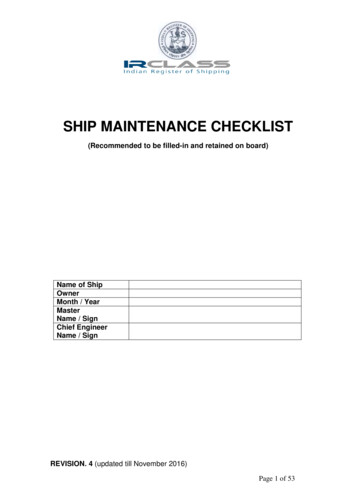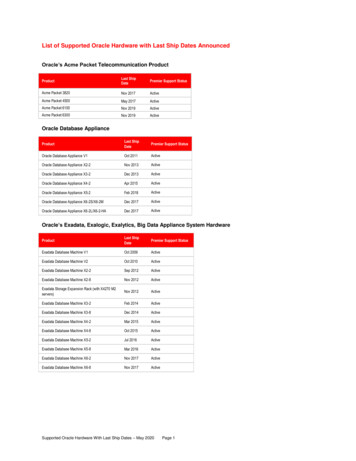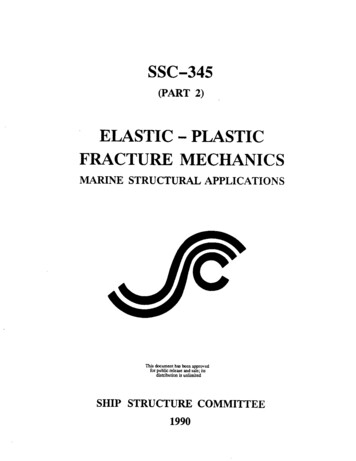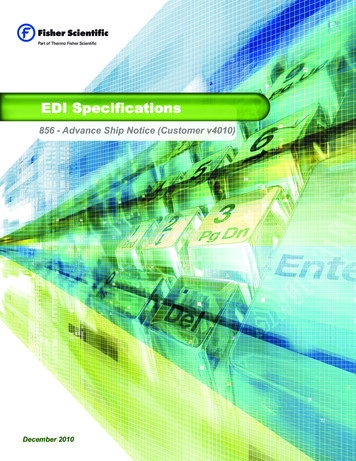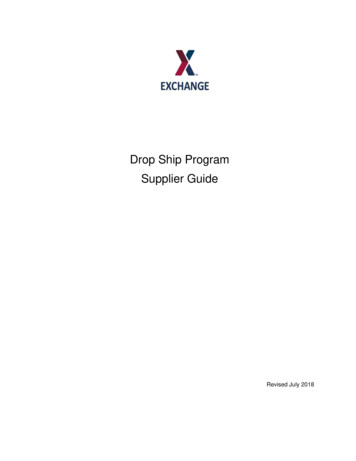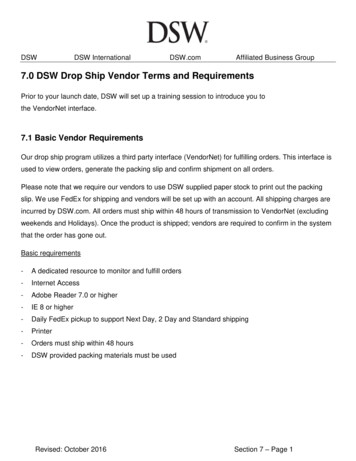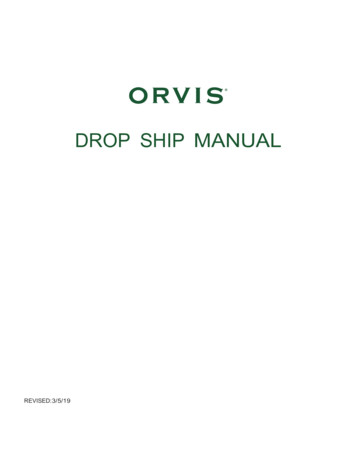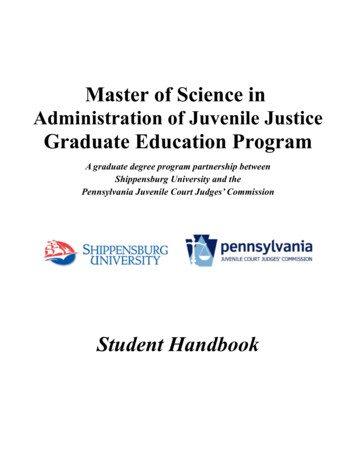
Transcription
Master of Science inAdministration of Juvenile JusticeGraduate Education ProgramA graduate degree program partnership betweenShippensburg University and thePennsylvania Juvenile Court Judges’ CommissionStudent Handbook
Table of ContentsRevised Fall 2020Welcome . 3Mission of the Department of Criminal Justice . 4Commitment to Ethical Practice . 5Department of Criminal Justice Honor Code . 6Administration of Juvenile Justice JCJC Graduate Education Program .7Student Planning Guidance . 7Scheduling/Registering for Courses. 7Withdrawing From Classes . 8Student Email Account . 8Course Grading . 9Shippensburg University Academic Standards. 10Dismissal for C or F Grades. 10Notice and Appeal. 10Readmission of Dismissed Students . 10Repeating Graduate Courses . 11Transfer Credit . 11Attendance Policy. 12Dispute Resolution for Academic Matters . 12Statute of Limitations . 12Withdrawal or Removal .13Program Course Guide. 14Student Practicum. 15Statute of Limitations on Practicum . . .15Research Involving Human Subjects . 16University Policy on Research Involving Human Subjects/Participants . 16Graduation. 18Applying for Graduation . 18Commencement Participation . 18Anthony F. Ceddia Award . 18Academic and Social Improvement Services . 19Important Documents and Contact Information . 20Appendices . 23Appendix A: Academic Dishonesty Policy . 241
Appendix B: Description of Courses. 282
WelcomeIn 1982, The Juvenile Court Judges’ Commission (JCJC) established the Center for JuvenileJustice Training and Research (CJJT&R) at Shippensburg University. CJJT&R is regarded asthe state and nationally recognized training, education, and research center for juvenile justice inPennsylvania. The JCJC endeavored to increase professionalism and cultivate future leaders inthe field of juvenile justice by offering a weekend master’s program in conjunction with theShippensburg University Criminal Justice Department.The Shippensburg University Criminal Justice Department was created in 1974 under thedirection of Roosevelt E. Shepherd, and prides itself on its longstanding history of being apremiere program in the State System of Higher Education, as well as the Commonwealth ofPennsylvania. The Department is one of seven units that make up the College of Education andHuman Services and offers both undergraduate and graduate degrees in criminal justice. Thedepartment’s faculty members are actively involved in research and service that address criticalissues in criminal justice and public safety.The Master of Science in Administration of Juvenile Justice Program at Shippensburg Universityprovides a quality graduate program that promotes advanced inquiry and application of newknowledge. One of the core values of Shippensburg University is to inspire and guide studentsto become successful leaders in their professions and their communities.The JCJC and the Shippensburg University Criminal Justice Department are dedicated toensuring your professional development and academic success. On behalf of the JCJC and theShippensburg University Criminal Justice Department, we extend a heartfelt welcome!3
Mission of the Department of Criminal JusticeThe Department of Criminal Justice in the College of Education and Human Services atShippensburg University adheres to the mission of the college and the University. The missionof the Department is to provide current and future criminal justice professionals with theinformation and skills they need to be effective decision makers in the criminal justice arena. Thefaculty strives to educate students to be critical thinkers who can communicate their thoughtseffectively in an oral and written form that demonstrates a comprehensive knowledge of thefield. These objectives are achieved through a balanced approach in which both theoretical andpractical issues are addressed. The Master of Science in Administration of Juvenile Justicecurriculum is guided by the following assessment objectives, which are evaluated, on a yearlybasis.OBJECTIVE 1: Comprehensive knowledge of juvenile justice: Students will understand morereadily the operations of both the juvenile and criminal justice system and the many issues (boththeoretical and practical) that confront the administration of justice in a democratic society.OBJECTIVE 2: Critical analysis: Students will understand more readily how to interpret,analyze and evaluate issues of importance in the field of juvenile justice.OBJECTIVE 3: Communication: Students will be able more readily to express their knowledgeand critical analysis ability through both written work and oral presentation.OBJECTIVE 4: Exposure to human and cultural diversity: Faculty will expose students to theissues of diversity in the juvenile justice system and provide opportunities for students toparticipate in experiences that promote diversity.OBJECTIVE 5: Exposure to ethical problem solving: Faculty will expose students to the natureof ethics in general and the role of normative ethics in the juvenile justice system and provideopportunities for students to participate in juvenile justice-related situations (hypothetical oractual) that deal with ethical issues.OBJECTIVE 6: Exposure to technology: Faculty will expose students to the use of technologyin the field of criminal justice in general and provide opportunities for students to participate injuvenile justice related situations that deal with technological issues.The Department’s major strengths are its applied perspective and strong emphasis on theory,policy, research, and analysis. Philosophy, format, and implementation stress the practicalapplication of a higher level of knowledge, skills, and strategies. The methodological andtheoretical elements are highly suitable as a preparation for entering the field, advanced graduatestudies, and other professional programs.STUDENT LEARNING OUTCOMESThe program is competency-based; its intent is to develop in students a set of competenciesjointly arrived at by the Shippensburg University Criminal Justice Department and the JCJC.Education for excellence in criminal and juvenile justice practice is the guiding mission of theDepartment of Criminal Justice at Shippensburg University. The faculty who teach in the JCJCprogram are committed to providing high quality education that will prepare students to provide4
practitioner-based services that are ethical, impartial, and effective in a rapidly changing andincreasingly diverse society.Upon completion of the program, student learners should possess: An advanced understanding of administrative principles and practices found in criminaland juvenile justice agencies.Advanced knowledge of theories relating to crime causation and criminality.In-depth knowledge of the interdisciplinary nature of the criminal and juvenile justicesystem.Knowledge of contemporary technologies used to manage juvenile justice information.Skills that enable the learner to conduct and evaluate criminal and juvenile justice-relatedresearch.Advanced problem-solving skills that enable the learner to identify, analyze, and solvejuvenile justice operational problems that affect the delivery of criminal justice-relatedservices.Advanced reading, writing, and verbal communication skills.Commitment to Ethical PracticeThe professions of Counseling & College Student Personnel, Criminal Justice, EducationalLeadership and Special Education, Teacher Education, Exercise Science, and Social Work andGerontology comprise the College of Education and Human Services (COEHS). The COEHS ischarged with upholding a learning environment in which faculty, administration, staff, andstudents work together to develop a lifetime commitment to being of service to others. Together,we define who we are and who we aspire to become as members of the COEHS community.Each of the professions represented in the College are guided by ethical codes of professionalpractice enforced through the prescribed channels of its profession. We acknowledge and respectthe individual codes and standards of ethical conduct that are prescribed by the disciplines of theCollege. From these codes our College has created a unifying ideal that consists of seven ethicalstatements of principle. These statements reflect the fundamental belief that intra-professionalcollaboration provides a more comprehensive service system to children, families, clients,students, and institutions than individual disciplines acting in isolation. The administration andfaculty of the COEHS believe that it is important to actively uphold the following standards ofethical conduct throughout their careers: Honoring, and dignifying ourselves and others;Valuing differences among and between us;Advocating for and acting to attain social justice;Using discretion vested in the privileges of our positions appropriately;Performing our jobs at the highest standard;Upholding the trust of those with whom we work; and,Respecting the work of other professionals.Individually, in order that others may know who I am, what I believe, and know of my works, I,with all others here, will be accountable for the privileges and responsibilities that accompanymy membership in the COEHS.5
Department of Criminal Justice Honor CodeShippensburg University is devoted to maintaining the highest level of professionalism in theservice fields, including criminal justice. To achieve our goal of strict ethical compliance, thestandards of conduct established by Shippensburg University and articulated in the Swataneystudent handbook, as well as this Honor Code and the graduate handbook, shall be applicable toall graduate Criminal Justice students at Shippensburg University.Any violation of this Honor Code as defined below may result in a disciplinary violation noted inthe student’s academic record and may include a determination whether the student is fit tocontinue in the Administration of Juvenile Justice Graduate Education Program. Any violation ofthe Swataney Honor Code shall be construed to be a violation of the Criminal Justice HonorCode. Any violation of this Honor Code may also be discussed with any present or futureemployer who seeks a reference or recommendation from the Criminal Justice Department. TheDepartment of Criminal Justice faculty retains the right to adjudicate and determine theappropriate sanction for violations of this Honor Code. A violation of this Honor Code in no waysupersedes any disciplinary action initiated by the Shippensburg University Judicial Board.Criminal Justice students are prohibited from engaging in acts of moral turpitude and in engagingin the following conduct:Academic dishonesty: A description of academic dishonesty can be found in AppendixA of this handbook as well as in the Graduate Student Catalog and via the Dean ofStudents website:http://www.ship.edu/dean of students/student conduct/academic policies/ .Lying: Making any false statement intentionally meant to deceive or defraud another inconnection with any activity under the purview of the Criminal Justice Department.6
Administration of Juvenile JusticeJCJC Graduate Education ProgramThe Administration of Juvenile Justice JCJC Graduate Education Program serves students whoare currently full-time in a county juvenile probation officers in Pennsylvania that have beenendorsed by the JCJC and meet the standards for admission. The Administration of JuvenileJustice JCJC Graduate Education Program is a 33-credit hybrid program of online and face-toface instruction with an expected completion within two academic years for full time students.Program courses are offered during the mornings (8:30 a.m. to 12:30 p.m.) and afternoons (1:30p.m. to 5:30 p.m.) on designated Saturdays and Sundays or online during the academic year.Classes run for the entire 15 weeks each fall and spring semester. During the shorter summerterms, all coursework is completed online.Students in the JCJC Graduate Education Program proceed through all courses as part of acohort. The cohort structure is a fundamental strength of the program. The cohort experience iscentral to the advancement of a statewide perspective in juvenile justice, leadership development,networking, and the establishment of long-term working relationships.Student Planning GuidanceEach JCJC Graduate Education Program student is assigned an academic advisor to assist inplanning their coursework leading to a Master of Science degree in Administration of JuvenileJustice. In consultation with their academic advisor, the JCJC Graduate Education ProgramCoordinator, and/or the JCJC/CJJT&R Director of Professional Development, students areresponsible for registering for courses and satisfying all degree requirements. Please consult withyour academic advisor, the JCJC Graduate Education Program Coordinator, and/or theJCJC/CJJT&R Director of Professional Development for information that may help you makedecisions about any of your academic questions and/or concerns.Scheduling/Registering for CoursesAll scheduling and schedule adjustments are completed online. Prior to scheduling, each studentshould consult with his/her advisor to review which courses to schedule. It is a student’sresponsibility to consult with their advisor. Information on how to schedule graduate courses isavailable online at http://www.ship.edu/Registrar/Graduate Scheduling Information/. Studentswill schedule courses via the MyShip portal (https://my.ship.edu) using the same username andpassword for their Ship email account. Students are responsible for registering for courses beforethe specified deadline as well as ensuring that all tuition and fees are paid. Registration deadlinesare available through the Registrar’s Office http://www.ship.edu/registrar/semester information/and information on tuition and fees can be found at Student Accountshttp://www.ship.edu/student accounts/. All Master of Science in Administration of JuvenileJustice courses are listed under the “Administration of Juvenile Justice” subject tab. Note: TheMyShip portal has summer courses listed under the following terms: Summer A andSummer B. Master of Science in Administration of Juvenile Justice courses will be foundunder both terms.7
Withdrawing From ClassesStudents who wish to withdraw from their course(s) should consult with the JCJC/CJJT&R –Director of Professional Development and visit the Registrar’s website for mester information/Student Email AccountEvery registered Shippensburg University student is assigned a campus email account andinstructions on how to activate the account. You must activate the account before sending orreceiving messages. The primary avenue of electronic communication with the university,faculty, and your academic advisor is your email account. You should check your email daily toensure that you do not miss important announcements regarding your classes. Informationregarding activation and use of email accounts can be found at:https://www.ship.edu/technology/student/student e mail services/.8
Course GradingYour quality point average or QPA is determined by assigning numerical values to the lettermarks and weighing them according to the number of class hours. The values assigned to theletters are:Regular Letter Grades*AAB BBCF4.0 quality points3.7 quality points3.3 quality points3.0 quality points2.7 quality points2.0 quality points0.0 quality points*Individual faculty members may choose to use single letter grades and not award plus/minusgrades.Special GradesIQPTRNWIncompleteDeferred GradePassedTransfer CreditAudit (no credit)WithdrawalTemporary Grades (Q and I)The grades Q and I are temporary grades, which mean you have not completed all therequirements for a particular course. With prior approval of the appropriate College Dean, thegrade of Q (deferred grade) may be awarded for courses such as practicum research that areplanned from the start to extend over more than one grade period. If you receive a Q grade in acourse, it is your responsibility to work closely with the instructor to plan a schedule in order tocomplete the work within three years at most, or the grade automatically converts to an F.The grade of I (incomplete) can be given if you are unable to complete the requirements of acourse due to a serious illness, death in the family, or other personal emergency. To request anincomplete in a particular course, you should apply directly to the instructor of the course. Applyto your College Dean if you are unable to complete the requirements for all your courses in agiven term. If the dean or instructor considers your reason for re
Classes run for the entire 15 weeks ea and spring semesterch fall . During the shorter summer terms, all coursework is completed online. Students in the JCJC Graduate Education Program proceed through all courses as part of a cohort. The cohort structure is a fundamental strength of the .
